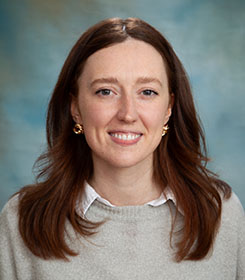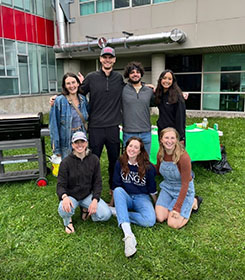This article is part of a series focusing on the grads of the Dalhousie Class of 2025. Spring Convocation takes place May 30 and from June 9-19 in Halifax and Truro. Read all our profiles here in one place as they are published.
Katie Brousseau’s path to planning began with a passion for justice and community well-being. Born and raised in Timberlea, N.S., she earned her Bachelor of Social Work from Dalhousie in 2017 and went on to work in housing and homelessness in both Nova Scotia and British Columbia.
 From frontline roles in emergency shelters to managing supportive housing for individuals living with HIV, she witnessed the impact of housing policy on the most vulnerable members of society. But it was her time as a Community Legal Worker with Dalhousie Legal Aid Service — representing tenants and providing public legal education on housing rights — that had the most significant impact on her commitment to housing policy and systems change.
From frontline roles in emergency shelters to managing supportive housing for individuals living with HIV, she witnessed the impact of housing policy on the most vulnerable members of society. But it was her time as a Community Legal Worker with Dalhousie Legal Aid Service — representing tenants and providing public legal education on housing rights — that had the most significant impact on her commitment to housing policy and systems change.
“Those experiences positioned me to witness firsthand how inadequate housing policy impacts people’s lives,” she says. “I found myself increasingly drawn to the systems-level questions — why housing was so hard to access, and how the structures informing it could be shaped to create more equitable outcomes.”
That curiosity brought her back to Dalhousie, this time as a student in the Master of Planning program, where she aimed to better understand the policies and processes that shape our built environments.
Learning through community and collaboration
Returning to school after five years in the workforce wasn’t easy, but Katie found strength in the support of those around her.
 “What got me through was the unwavering support of my family, friends, colleagues. And, of course, my classmates,” she says. “Grad school isn’t easy, and I learned to lean on the people around me.”
“What got me through was the unwavering support of my family, friends, colleagues. And, of course, my classmates,” she says. “Grad school isn’t easy, and I learned to lean on the people around me.”
For Katie, the most meaningful part of the program was the community she found within it.
Shown left: Katie, front centre, with fellow classmates.
“The graduating class of 2025 is full of brilliant, passionate individuals. I learned from them every day — their perspectives, drive, and enthusiasm inspired me to grow as both a professional and a person.”
She also found inspiration and mentorship in the faculty, particularly Dr. Eric Rapaport, who supported her independent research on how Canadian courts interpret “adequate shelter” in the context of encampment evictions.
“His mentorship positioned me to undertake this research with confidence and enthusiasm,” she says.
Outside the classroom, Katie’s co-op with Tim Welch Consulting allowed her to support non-profits planning and funding affordable housing projects in Nova Scotia and Ontario — experience she describes as a major highlight.
Planning with empathy and vision
Katie’s foundation in social work continues to inform her values and vision as a planner.
“Planning is about looking ahead toward sustainable growth, change, and new possibilities for our communities,” she explains. “At the same time, social work taught me to always look back and ask: who might be getting left behind?”
Real change happens when we work across difference with humility and care
This dual lens — combining systems thinking with real-world equity concerns — has shaped how she approaches planning today. “We don’t do this work alone,” she says. “Real change happens when we work across difference with humility and care.”
That ethos will guide her in her new role as a policy consultant with Turner Drake & Partners, where she’ll continue to work at the intersection of housing development, policy, and community planning.
“I’m excited to keep helping communities and individuals navigate complex housing challenges—with empathy, creativity, and curiosity.”
Advice and gratitude
Katie offers thoughtful advice for new planning students: “Stay curious and connected to the world around you. Follow the news from multiple sources. Pay attention to what’s being built, how people move through space, and what challenges and opportunities your community is facing.”
“Lean on your classmates and professors,” she adds. “Some of the best learning happens outside of class. You’ll get as much out of the program as you put in — but don’t forget to rest and have fun.”
As she reflects on graduation, Katie feels immense gratitude for her time in the program. “This experience reaffirmed that growth is always possible and that meaningful change doesn’t happen in isolation. Earning a Master of Planning and continuing this work in housing is a profound privilege — one that means more to me than I can say.”

